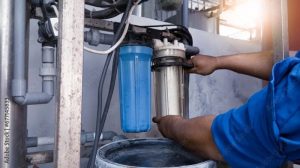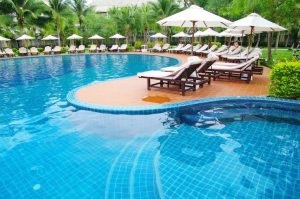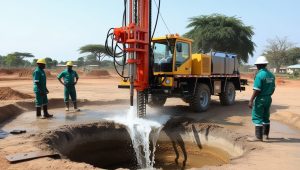Need a trusted borehole water treatment in Ghana? Call or WhatsApp us now: 0243174009
Access to clean and safe water is a fundamental human need. In Ghana, more households, businesses, farms, and institutions are turning to boreholes as a reliable water source due to increasing demand and inconsistent municipal supply.
While borehole water is often considered pure, it is not always safe for drinking or domestic use without proper treatment. This makes borehole water treatment in Ghana more important than ever.
If you own or plan to install a borehole in Ghana, understanding how to treat the water to meet safety standards is essential.
This guide provides an in-depth look at why borehole water must be treated, the various treatment options available, the cost involved, and how to find the best water treatment professionals in Ghana.
Why Borehole Water Treatment in Ghana?
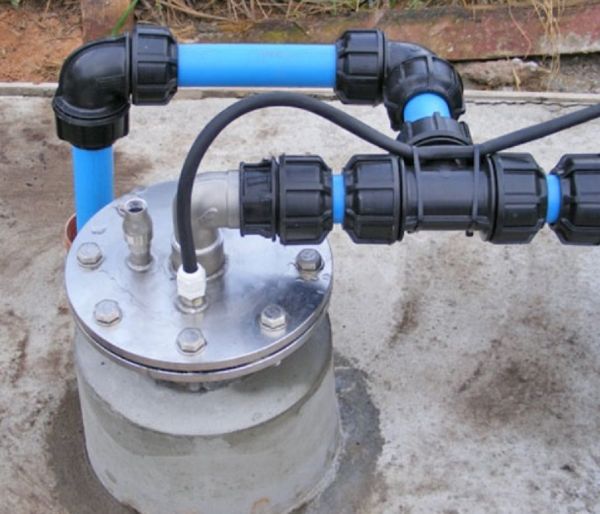
Many people assume that water pumped from underground sources is naturally clean. However, borehole water in Ghana can be contaminated by several factors, including:
- Iron and manganese deposits in the soil
- Bacteria and microorganisms, such as E. coli and coliforms
- High mineral content (hard water)
- Industrial and agricultural runoff
- Salt intrusion in coastal areas like Tema and Dansoman
- Rust or debris from old pipes and tanks
Without proper water treatment, using untreated borehole water can cause staining on laundry and appliances, damage to plumbing systems, and in some cases, serious health issues.
Therefore, borehole water treatment systems are essential for:
- Making water safe for drinking and cooking
- Enhancing taste, color, and odor
- Protecting your family, employees, or customers
- Ensuring compliance with water quality standards in Ghana
Common Borehole Water Contaminants Found in Ghana
The specific composition of borehole water in Ghana varies by region, but common issues include:
- Iron and manganese: These minerals stain tiles, clothes, and fixtures and can give water a metallic taste.
- Bacteria and pathogens: Common in areas near septic tanks or unprotected latrines, bacteria can cause gastrointestinal infections.
- Hard water (calcium and magnesium): Leads to scale buildup in pipes and reduces the lifespan of appliances.
- Nitrates and nitrites: Often found in agricultural areas where fertilizers are used.
- Salinity: Common in coastal communities like Accra, Ada, and Takoradi.
Before choosing a treatment method, it is vital to test your borehole water.
Borehole Water Testing in Ghana
Professional water testing is the first step in any treatment process. It helps identify the contaminants present and the most suitable solution. Many water treatment companies and laboratories in Accra, Kumasi, and other cities offer borehole water testing services.
Typical water tests include:
- pH level
- Total dissolved solids (TDS)
- Hardness level
- Iron and manganese levels
- Bacteria (coliform and E. coli)
- Turbidity (cloudiness)
- Nitrate and nitrite levels
You can contact certified water labs or borehole service providers in Ghana for accurate and affordable testing, usually ranging from Ghc 300 to Ghc 600, depending on the parameters tested.
Types of Borehole Water Treatment Systems in Ghana
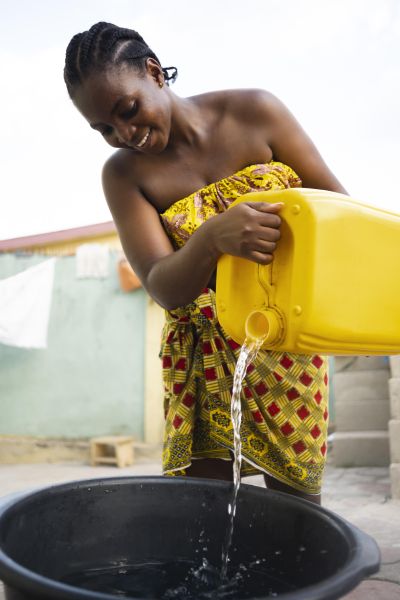
After testing your water, the next step is choosing the right borehole water treatment system based on your specific needs. Here are the most common treatment options used in Ghana:
1. Sediment Filtration
This is the first stage of most water treatment setups. Sediment filters remove sand, rust, dirt, and visible particles from borehole water. These filters are essential for households and farms that receive cloudy or murky water from their boreholes.
Price Range: Ghc 200 – Ghc 1,000 depending on the size and capacity.
2. Iron Removal Systems
Iron and manganese are among the most common issues in borehole water in Ghana, especially in regions like Ashanti and Eastern Regions. Iron removal filters use oxidation and filtration media to eliminate iron and manganese, preventing reddish-brown stains on tiles, sinks, and clothes.
Types of Iron Filters:
- Birm filters
- Catalytic carbon filters
- Greensand filters
Price Range: Ghc 1,500 – Ghc 5,000
3. Water Softening Systems
Hard water causes scaling in kettles, washing machines, and pipelines. A water softener replaces calcium and magnesium with sodium ions to prevent this buildup. It’s particularly useful in areas with limestone-rich soil.
Price Range: Ghc 3,000 – Ghc 7,000
4. UV Water Purification
Ultraviolet light systems are effective in killing bacteria and viruses without altering the taste or chemical composition of the water. They are widely used for boreholes located near septic systems or in areas with poor sanitation.
Price Range: Ghc 2,000 – Ghc 4,500
5. Reverse Osmosis (RO) Systems
RO is a high-performance filtration method that removes up to 99% of impurities. It is ideal for homes and businesses that require very pure water for drinking or food preparation. RO systems use multiple membranes to filter heavy metals, salts, bacteria, and even chemicals.
Price Range: Ghc 3,000 – Ghc 12,000
6. Chlorination Systems
This is a chemical treatment method used to disinfect borehole water and kill pathogens. Chlorinators can be manual or automated, depending on the size and use of the water system. Most estate boreholes and schools use this method for large-volume water disinfection.
Price Range: Ghc 500 – Ghc 3,000
Borehole Water Treatment for Homes vs Businesses
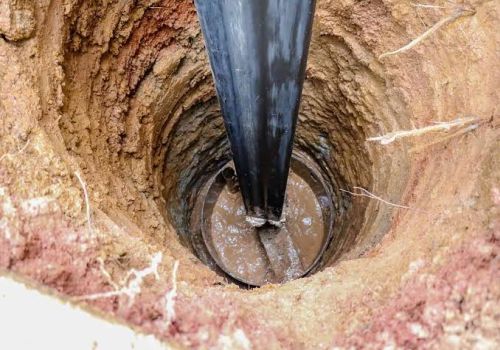
The type of treatment system you choose depends on the volume of water used and the level of purity required.
For Homes:
- Sediment filters
- Iron removal filters
- UV disinfection
- Reverse osmosis (for drinking only)
For Businesses, Schools, Farms, and Estates:
- Large-scale chlorination systems
- Industrial-grade iron and hardness removal systems
- Bulk UV purification systems
- Automated filtration and monitoring equipment
Borehole Water Treatment Installation in Ghana
Installing a borehole water treatment system in Ghana typically involves the following steps:
- Site inspection and water testing
- Design of a custom treatment system based on test results
- Procurement of equipment and materials
- Installation of filters, tanks, pumps, and control valves
- Testing and commissioning of the system
Professional water treatment companies in Ghana often offer both products and installation services. Some of the popular locations where you can get installation support include:
- Accra (East Legon, Spintex, Achimota)
- Tema and Ashaiman
- Kumasi
- Takoradi
- Cape Coast
- Tamale
Also read: Find a Trusted Swimming Pool Contractor in Accra Today!
Borehole Water Treatment System Prices in Ghana
Here’s a breakdown of estimated costs for complete borehole water treatment systems in Ghana:
| Treatment Type | Estimated Price Range (Ghc) |
|---|---|
| Basic filtration system | 1,000 – 2,000 |
| Iron & manganese removal | 2,000 – 5,000 |
| Water softener | 3,000 – 7,000 |
| UV sterilizer | 2,000 – 4,500 |
| Reverse osmosis system | 3,000 – 12,000 |
| Complete home treatment setup | 5,000 – 15,000 |
| Industrial/commercial system | 10,000 – 30,000+ |
Note: Prices depend on water volume, location, brand, and installation complexity.
Where to Buy Borehole Water Treatment Systems in Ghana
There are several reputable dealers, installers, and water engineering firms in Ghana that specialize in borehole water treatment. Some operate both physical shops and online stores. You can also reach out to platforms like Borehole Ghana to request a custom quote or site visit for borehole treatment services.
Look out for suppliers and technicians in:
- Accra (Dzorwulu, Lapaz, Madina, Kaneshie)
- Kumasi (Adum, Ahodwo)
- Tema (Community 1, Community 25)
- Online platforms with nationwide delivery and installation
Benefits of Treating Borehole Water
- Protects your family’s health from bacteria and pathogens
- Prolongs the life of water-using appliances
- Prevents rust stains on plumbing fixtures and tiles
- Improves taste, smell, and clarity of water
- Meets Ghana Standards Authority water quality standards
- Saves money on bottled water and health-related costs
Maintenance Tips for Your Borehole Water Treatment System
Once installed, borehole treatment systems must be properly maintained to function efficiently. Here are some tips:
- Replace filters regularly (usually every 3 to 6 months)
- Backwash iron removal media as required
- Monitor pressure gauges and flow rates
- Check UV lamps annually and replace as needed
- Have your water tested at least once a year
- Service your equipment with certified technicians
Call to Action: Let Us Help You Treat Your Borehole Water
Are you using borehole water in your home, school, farm, or office? Do you want it to be clean, safe, and healthy? Contact us today for professional borehole water treatment in Ghana.
Our team of experts can test your water, recommend the right solution, and install a durable system tailored to your needs and budget.
📞 Call or WhatsApp: 0243174009
📍 Service Areas: Accra, Tema, Kumasi, Takoradi, Cape Coast & Nationwide
Let’s help you make your borehole water treatment in Ghana clean, safe, and fit for every use.

